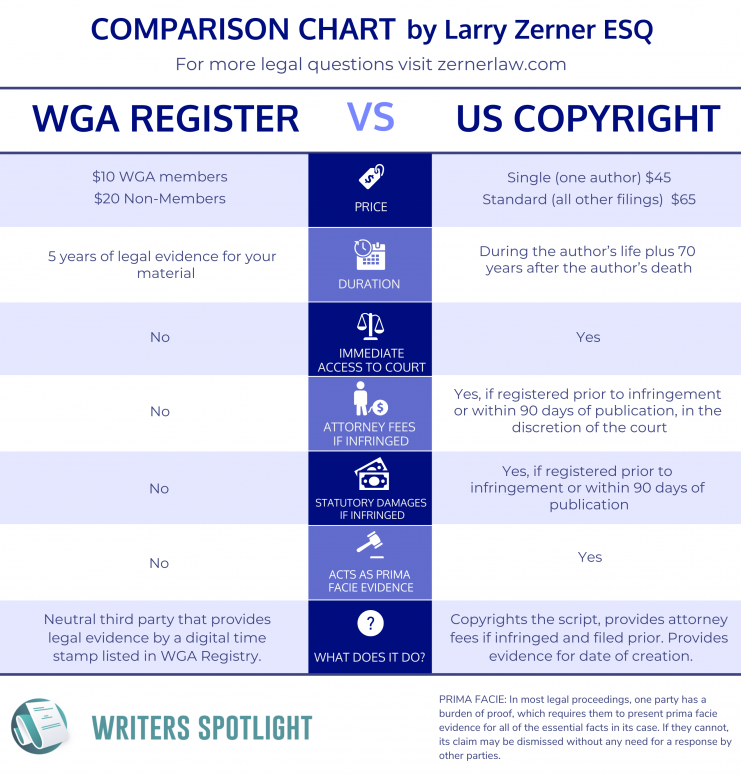WGA Register vs U.S. Copyright: Where should I register my script?
Disclaimer: The information below is not legal advice. It’s simply our best interpretation of the services offered by the WGA and the Library of Congress, after extensively reading through the content on both websites. If you feel you need legal advice on whether to register with the WGA, or copyright with the U.S. Library of Congress, or both, please ask an entertainment lawyer.

What’s the difference between registering your script with the WGA or with the US Library of Congress Copyright Office?
There is a lot of confusion when it comes to the differences between WGA registration and Copyright. Below are a few points of confusion that we have addressed.
Can you copyright an idea?
You cannot register or copyright an idea. There is no way for you to protect your idea for a feature or tv series. You can only protect the actual script.
Should you do a “poor man’s” copyright?
When you’ve created a work, it’s automatically copyrighted. That’s why some people try the poor man’s copyright method by sending the script to themselves unopened in the mail. That creates a timestamp on the work so if you ever ended up in court, there is proof the script was written before the date posted in the mail.
Why is this a terrible idea?
Regarding a poor man’s copyright, the copyright office states: “There is no provision in the copyright law regarding any such type of protection, and it is not a substitute for registration.” copyright.gov/poorman
If your script is stolen, what evidence will you need?
If your script gets stolen and you choose to go to court, YOU are the one bringing legal proceedings and that means the burden of proof lies with you. You have to bring forth enough evidence for your defense in order to even have a court case.
If the only evidence you’re providing is you mailed this to yourself, it will not be enough evidence to move forward with a court case. You need concrete evidence that will at the very least provide enough proof that you have a case against the party that stole your script. When it comes to evidence in a claim against another party, the strongest burden of proof for your work is the U.S. Copyright Office.
At what point do you have to copyright your script in order to receive statutory damages?
Entertainment lawyer Larry Zerner further explains that,
“according to §412 of the U.S. Copyright Act, in a lawsuit for copyright infringement, the Plaintiff cannot receive either attorney’s fees or statutory damages unless they registered with the Copyright Office before the infringement commences.”
He additionally mentions that,
“Judges interpreting §412 have interpreted “commencement” to mean the first act of infringement in a series of ongoing separate infringements. In the case of motion pictures, the first act of infringement would typically occur at the time a screenplay containing infringing material is written, not the release of the movie. This means that even if the aggrieved screenwriter finds out about the infringing movie and registers with the Copyright Office before the film’s release, it’s almost certainly too late. Since the writer registered after commencement of the infringement, he or she could not receive statutory damages or attorney’s fees in any subsequent litigation.”
You can read more of his knowledgeable article here: zernerlaw.com/blog/its-time-for-the-writers-guild-to-shut-down-the-wga-registry/
Then what does the WGA Registration do?
- It creates legal evidence for your work.
- The legal evidence includes: The registered work you submitted and the date it was submitted.
- The registry acts as a neutral third party in the event your script was stolen and will provide the evidence listed above.
- Your registered work will be stored for five years.
What does the WGA Registration not do?
- This legal evidence provides a timestamp on the work, but not proof of authorship. They will provide evidence you submitted the work to them on a specific date, but that’s it.
- The WGA will not provide evidence in your case if it is after the five years and you have not renewed your registration.
- Will not provide attorney fees or statutory damages.
What does the Library of Congress Copyright do?
- Acts as prima facie evidence. Prima facie is sufficient corroborating evidence to support a case. While this evidence may not be enough to win a case, it is enough for you to take the claim to court.
- Registered works may be eligible for statutory damages and attorney fees in successful litigation.
What does the Library of Congress Copyright not do?
- Will not be eligible for attorney fees or statutory damages if the registration is after the copyright infringement occurs.
What are the price differences?
I’ve heard many writers decide to register with the WGA instead of Copyright because of the price. They claim the WGA is cheaper. Well, that’s technically not true. The upfront cost is cheaper with the WGA, but in the long run it is cheaper to copyright with the Library of Congress.
WGA Registration
$20 for non-WGA members for 5 years.
US Copyright
$45 for life plus 70 years after author’s death.
$65 for more than one author.
After ten years, you will have paid more for the WGA registration than the copyright and you will have to continually renew the WGA every five years. You might think that you’ll be able to sell that script within 10 years and you could be right. However, keep in mind there are several known writers that have scripts they’ve been sitting on for 20+ years.
In addition, if you want to go to court to sue for copyright infringement in the U.S. you’ll have to register your work with the U.S. Copyright Office. This means you will have to pay the copyright fee if you go to court anyway. So, you’re not saving money.
In conclusion, WGA registration does not take the place of Copyrighting your script with the U.S. Library of Congress. Registering with the WGA should only be considered an additional form of protection rather than a substitute for copyright.
Writers Spotlight:
Script protection is very important to our website. See how you can maintain control over your script’s privacy settings in our app ScriptShare.
Resources:
